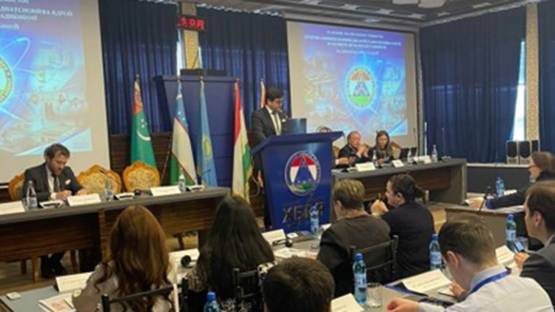At the recent IAEA Central Asian seminar in Dushanbe, Tajikistan, the legislative aspects of the nuclear sector were discussed, as the IAEA plays an important role in assisting in the development of a legislative framework to improve the reliability of nuclear installations and materials.
The regional seminar on nuclear law brought together 24 representatives from 11 countries — Armenia, Belarus, Bulgaria, Georgia, Kazakhstan, Latvia, the Republic of Moldova, Russia, Tajikistan, Turkmenistan and Uzbekistan, the IAEA reports.
“Nuclear energy has the potential to provide a significant contribution to the world’s energy needs while reducing carbon emissions. But it also presents unique legal challenges that need to be addressed. As such, the importance of nuclear law cannot be overemphasized,” said lhom Mirsaidzoda, the Director of the Chemical, Biological, Radiological and Nuclear Safety and Security Agency of Tajikistan.
“The workshop was very informative and beneficial to us, since Armenia is currently in the process of a new draft law, aimed at strengthening the national legal framework, harmonizing the national regulation with EU directives and expanding the nuclear programme,” said Hrachya Yavroyan, Head of the Radiation Safety Department at the Armenian Nuclear Regulatory Authority. “We would welcome further legislative assistance to benefit more from the bilateral legislative review assistance from the IAEA.”
During the seminar, delegates from each country provided information on the nuclear sector and nuclear legislation in their countries. Even countries with past experience of working with nuclear law have expanded their knowledge in this area, as legislators still face difficulties on topics such as liability for nuclear damage.
“Kazakhstan has enjoyed many years of cooperation with the IAEA, including as host of the IAEA Low Enriched Uranium Bank, and this workshop is a great opportunity for us to further gain knowledge and benefit more from the IAEA Legislative Assistance Programme to improve our national legal framework further,” said Ms Gulbarshyn Kanagatova, Chief Expert of the Committee of Atomic and Energy Supervision and Control of the Ministry of Energy of the Republic of Kazakhstan.
The IAEA experts who attended the seminar presented a comprehensive overview of the main aspects of nuclear lawmaking, paying special attention to the main international legal framework for nuclear safety, security, safeguards and liability. The experts summarized the key elements that make up the comprehensive national nuclear legislation and helped to understand some complex legislative terms. They also explained the functions of the IAEA Legislative Assistance Program and the benefits it provides to Member States. In addition, they were able to provide legislative assistance through bilateral discussions with all interested parties.
Support under the IAEA Legislative Assistance Program is available to all countries upon request, regardless of the scope of activities and facilities in each country.
In addition, the seminar allowed to discuss a difficult issue for many countries – namely, the improvement of the national legal framework, consisting of many legislative acts, including general laws applicable to nuclear activities.
Central Asia is showing increased interest in nuclear energy as a sustainable and reliable source of energy.
Uzbekistan has begun preparations for the construction of its first nuclear power plant, and the Ministry of Energy of Kazakhstan recently announced the possibility of resuming the use of nuclear energy to reduce the country’s dependence on fossil fuels.
The role that nuclear power can play in improving energy security in the region, as well as in reducing greenhouse gas emissions, is increasingly being explored. These steps for the resumption or development of nuclear energy programs require a reliable legal framework in the field of nuclear energy. ///nCa, 26 May 2023
